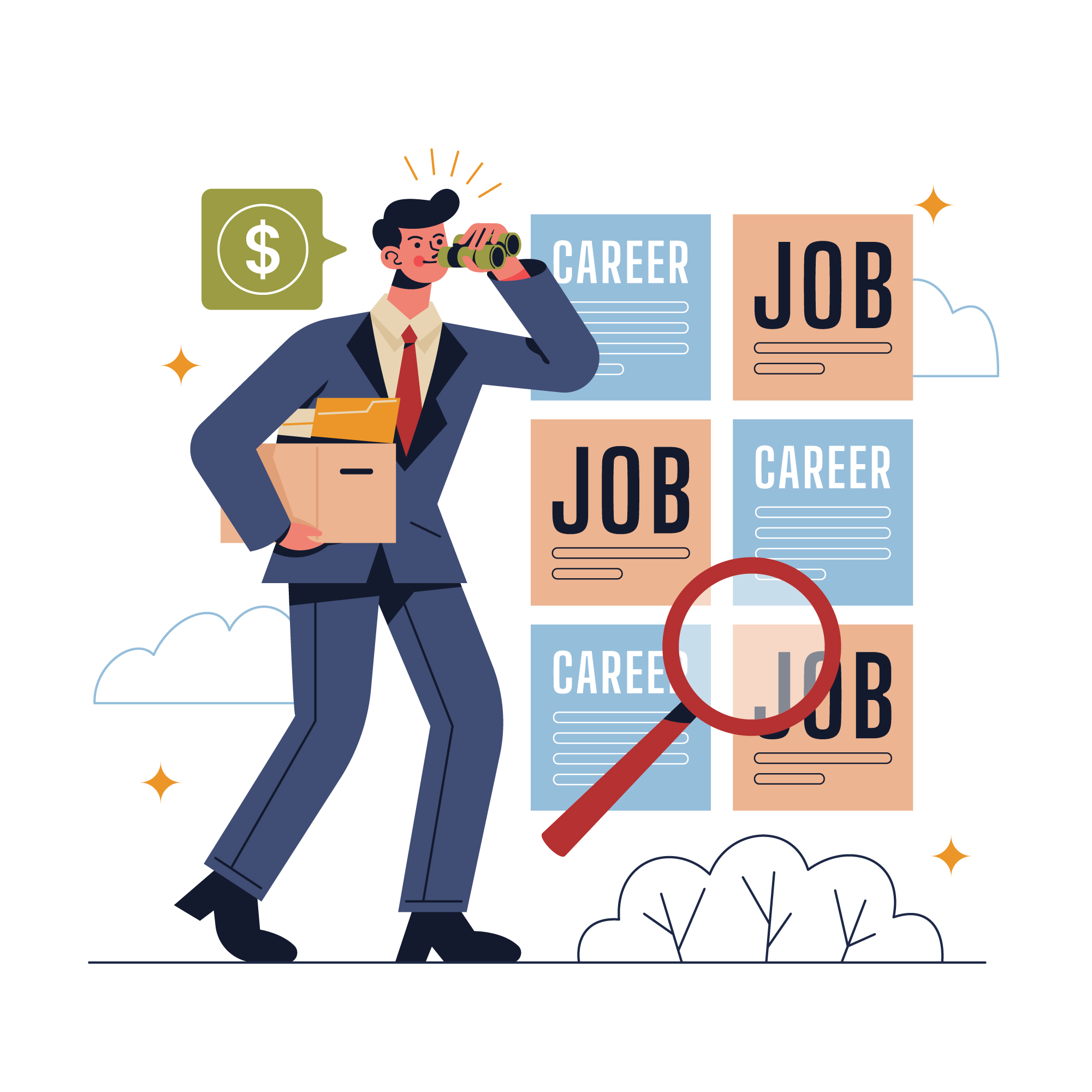As we move closer to 2025, the U.S. job market is undergoing a transformation fueled by technological advancements, evolving industries, and changing societal needs. From artificial intelligence to renewable energy, new opportunities are emerging in various fields, offering promising careers for those equipped with the right skills and knowledge.
In this blog post, we’ll dive into the top jobs projected to dominate the U.S. job market in 2025, exploring what makes these roles stand out, the skills required, and the opportunities they offer. Whether you’re just starting your career or considering a pivot, understanding these trends can help you position yourself for success.
1. Artificial Intelligence and Machine Learning Specialists
Why It’s in Demand
Artificial intelligence (AI) and machine learning (ML) are transforming industries, from healthcare and finance to retail and logistics. AI specialists develop systems that can analyze data, predict trends, and automate tasks, making businesses more efficient and competitive. As companies invest heavily in AI, the demand for skilled professionals in this field is skyrocketing.
Key Roles:
- AI Engineer
- Machine Learning Researcher
- Data Scientist
Skills Needed:
- Proficiency in programming languages like Python, R, and Java.
- Knowledge of AI frameworks (e.g., TensorFlow, PyTorch).
- Strong analytical and problem-solving skills.
Why You Should Consider It
AI and ML roles often come with high salaries, with average earnings ranging from $120,000 to $160,000 annually, depending on experience and location. With the global AI market expected to grow exponentially, this is a field with long-term career stability and growth.
2. Healthcare Professionals
Why It’s in Demand
The healthcare sector continues to expand due to an aging population, increased healthcare accessibility, and advancements in medical technology. Roles like nurse practitioners, medical coders, and telemedicine specialists are especially in demand, offering opportunities for hands-on and remote healthcare work.
Key Roles:
- Nurse Practitioner
- Telemedicine Specialist
- Medical Coder
- Health Data Analyst
Skills Needed:
- Clinical knowledge and patient care expertise.
- Familiarity with telemedicine platforms.
- Certifications such as CPC (Certified Professional Coder) or RN (Registered Nurse).
Why You Should Consider It
The average salary for a nurse practitioner is $126,000 per year, with over 130,000 new jobs projected. Telemedicine roles are growing rapidly, providing flexibility and work-life balance while making healthcare accessible to underserved populations.
3. Cybersecurity Specialists
Why It’s in Demand
As cyber threats become more sophisticated, the need for professionals who can safeguard digital infrastructure is greater than ever. Cybersecurity specialists are the backbone of modern IT systems, protecting sensitive data and preventing breaches that could cost companies millions.
Key Roles:
- Cybersecurity Analyst
- Ethical Hacker
- Information Security Manager
Skills Needed:
- Knowledge of cybersecurity frameworks and protocols.
- Certifications like CISSP (Certified Information Systems Security Professional) or CEH (Certified Ethical Hacker).
- Experience with threat detection and incident response.
Why You Should Consider It
Cybersecurity professionals are highly valued, with salaries ranging from $90,000 to $150,000. The increasing reliance on digital systems ensures that demand for this role will only continue to grow.
4. Data Scientists and Analysts
Why It’s in Demand
In today’s data-driven world, companies rely on data scientists and analysts to interpret complex information, identify trends, and make informed decisions. These professionals play a critical role in shaping strategies and improving business outcomes.
Key Roles:
- Data Scientist
- Business Analyst
- Data Engineer
Skills Needed:
- Strong statistical and analytical skills.
- Proficiency in tools like SQL, Tableau, and Python.
- Experience with data visualization and predictive modeling.
Why You Should Consider It
Data scientists enjoy high salaries, often earning upwards of $100,000 annually. As organizations continue to prioritize data, this career offers stability, growth, and opportunities across industries.
5. Renewable Energy Technicians
Why It’s in Demand
As the world shifts toward sustainable energy solutions, the renewable energy sector is booming. Solar and wind energy technicians are at the forefront of this green revolution, ensuring the maintenance and efficiency of renewable energy systems.
Key Roles:
- Solar Panel Technician
- Wind Turbine Technician
- Energy Efficiency Specialist
Skills Needed:
- Technical skills in electrical systems and renewable energy technologies.
- Certifications in solar or wind energy systems.
- Problem-solving and repair expertise.
Why You Should Consider It
These roles offer competitive salaries, with solar technicians earning an average of $56,000 annually. With environmental concerns driving investment in renewable energy, this sector is expected to see rapid growth in the coming years.
6. Software Developers
Why It’s in Demand
Software developers design, build, and maintain applications that power our digital world. With the continued growth of technology, e-commerce, and mobile apps, developers are essential for meeting consumer and business needs.
Key Roles:
- Front-End Developer
- Back-End Developer
- Full-Stack Developer
Skills Needed:
- Proficiency in programming languages like JavaScript, Java, and Python.
- Experience with frameworks like React and Angular.
- Problem-solving and debugging skills.
Why You Should Consider It
Software developers are among the highest-paid professionals, with average salaries ranging from $110,000 to $140,000. This career offers flexibility, remote work opportunities, and the chance to work on cutting-edge technologies.
7. Mental Health Professionals
Why It’s in Demand
Mental health awareness is at an all-time high, and the demand for counselors and therapists is growing. Virtual health platforms have made mental health services more accessible, creating new opportunities for professionals in this field.
Key Roles:
- Virtual Counselor
- Licensed Therapist
- Psychiatrist
Skills Needed:
- Empathy and strong communication skills.
- Certifications and licenses in mental health counseling.
- Familiarity with telehealth platforms.
Why You Should Consider It
Mental health professionals can earn competitive salaries while making a meaningful impact. Virtual counselors and therapists also enjoy flexibility and remote work opportunities.
8. Logistics and Supply Chain Managers
Why It’s in Demand
With the rise of e-commerce and global trade, logistics professionals are crucial for ensuring efficient supply chains. From sourcing materials to delivering products, logistics managers play a vital role in keeping businesses running smoothly.
Key Roles:
- Supply Chain Manager
- Logistics Coordinator
- Warehouse Manager
Skills Needed:
- Knowledge of inventory management and logistics software.
- Strong organizational and planning skills.
- Experience in supply chain optimization.
Why You Should Consider It
Logistics roles offer stability and competitive salaries, with opportunities to work in diverse industries, from retail to manufacturing.
9. Educational Professionals
Why It’s in Demand
Education remains a cornerstone of society, with growing demand for educators in STEM, special education, and remote learning. Teachers and instructional designers are essential for preparing the workforce of tomorrow.
Key Roles:
- STEM Educator
- Special Education Teacher
- Instructional Designer
Skills Needed:
- Strong communication and teaching skills.
- Certifications in education and specialized subjects.
- Familiarity with e-learning platforms.
Why You Should Consider It
Educational professionals have the chance to shape future generations while enjoying job stability and meaningful work. Salaries vary but often increase with experience and specialization.
10. Construction Managers
Why It’s in Demand
As infrastructure development ramps up, skilled construction managers are needed to oversee large-scale projects. These professionals ensure that projects are completed on time, within budget, and to the required quality standards.
Key Roles:
- Construction Project Manager
- Site Supervisor
- Estimator
Skills Needed:
- Expertise in project management and budgeting.
- Knowledge of construction methods and safety protocols.
- Strong leadership and organizational skills.
Why You Should Consider It
Construction managers earn competitive salaries, often ranging from $95,000 to $120,000 annually. With ongoing infrastructure investments, this is a stable and rewarding career.
How to Prepare for These Roles with VioResume
Landing a top job in 2025 requires a standout resume that highlights your skills, achievements, and qualifications. VioResume offers ATS-optimized templates designed to showcase your expertise and get your resume noticed by hiring managers.
Why Choose VioResume:
- Industry-Specific Templates: Tailored designs for roles in healthcare, tech, education, and more.
- ATS Optimization: Ensure your resume passes automated screenings.
- Customizable Layouts: Highlight your skills, certifications, and achievements effectively.
Start building your resume today with VioResume’s templates here to secure your dream job in 2025.
Conclusion
The job market in 2025 is set to be dynamic, with opportunities across AI, healthcare, cybersecurity, and more. By understanding these trends and preparing a tailored resume, you can position yourself for success in these high-demand fields. With tools like VioResume, you’ll be ready to make a strong impression and land the career of your dreams.











